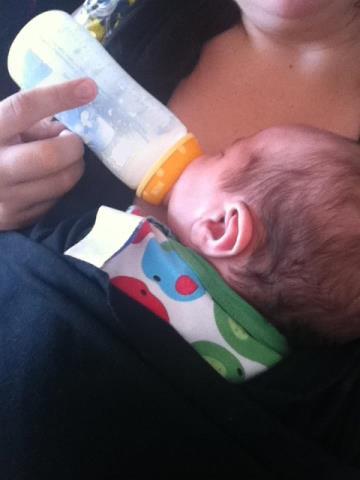 We humans have survived tens of thousands of years without toddler formula as well as cow’s milk, so I think we should have a healthy skepticism of the entire toddler formula industry, which didn’t even exist 25 years ago (read my previous article on toddler formula here). But here we are, with the same infant formula companies now trying to convince us that our children are better off with their product. One brand in particular, Enfamil’s Enfagrow chocolate flavored toddler formula, was pulled off the shelves just three years ago after massive criticism from doctors and nutritionists, and it remains a cautionary tale of the entire industry. Here’s a terrific quote back then from pediatric blogger, Seattle Mama Doc Wendy Swanson:
We humans have survived tens of thousands of years without toddler formula as well as cow’s milk, so I think we should have a healthy skepticism of the entire toddler formula industry, which didn’t even exist 25 years ago (read my previous article on toddler formula here). But here we are, with the same infant formula companies now trying to convince us that our children are better off with their product. One brand in particular, Enfamil’s Enfagrow chocolate flavored toddler formula, was pulled off the shelves just three years ago after massive criticism from doctors and nutritionists, and it remains a cautionary tale of the entire industry. Here’s a terrific quote back then from pediatric blogger, Seattle Mama Doc Wendy Swanson:
Chocolate formula: I hate it. How else can I say this? Um, I abhor, am disgusted, and am aghast that this product exists. Sincerely. I’m no Michael Moore, but this makes me want to picket, write a nasty letter, film a documentary, or boycott Enfamil products. Anyone interested in joining my tirade?
I would NEVER recommend this “formula” nor would the dozen or so pediatricians, pediatric gastroenterologists, nutritionists, and pediatric obesity experts I’ve spoken with. Read this and this. This will hurt children, not help them. This new “formula” preys on parents fears that their children aren’t getting what they need from the food they eat. Most parents worry about toddlers eating between 12 and 36 months at some point. Often it’s because as growth slows down after a child’s first birthday and children get more decisive about what they want, eating patterns change and toddlers eat less. Don’t let it scare you. As a parent, your job will always be to provide healthy food choices. Your child’s job, to eat. No child needs formula after 12 months of age unless a prescription for special formula is suggested by their pediatrician in extremely rare cases.
Another pediatric blogger, Dr Sue Hubbard, also wrote some words of wisdom on her blog, The Kids Doctor:
While there have been several products that have been brought to market in the last few years, so called toddler’s formulas, there is really no evidence to show that these are preferable to using cow’s milk you’re your child reaches 1 year of age.
The toddler’s formula does contain more calcium and phosphorous than infant formulas, but beyond that there is really no advantage to using a toddler formula over milk. It really seems to be an expensive marketing ploy directed to parents who are concerned about calories and vitamins.
The American Academy of Pediatrics recommends that 1 year old children either continue breast feeding or make the transition to whole milk. It is also recommended that child transitions from bottle to a cup (sippy cup is fine)…
…Just let them drink their nutrition (somewhat like an adult who might need a nutritional supplement like Ensure while they are sick), but this may not be the answer as this really just reinforces poor eating habits. Like many things in parenting, the “perceived” easy solution, may not always be the best.
So, at the end of the day there is little need for “follow up formulas” for the otherwise healthy toddler. Save the money, buy whole cow’s milk unless otherwise directed by your pediatrician. Make sure that your child is getting about 16–18 ounces of milk a day and several other servings of dairy products. If you are really concerned about calcium and vitamin D as well as other vitamins, then offer them an over the counter vitamin supplement.
Let’s also hear from famous nutritionist and author Marion Nestle, from her blog at Food Politics:
UPDATE 2024: Please follow me at my new website, DrSaintCyr.com. Also my new YouTube channel youtube.com/@drsaintcyrMead-Johnson may be withdrawing the Chocolate version, but it is keeping the Vanilla… What’s the difference? The Vanilla has exactly one gram less sugar than the Chocolate, 18 grams per 6-ounce serving, rather than 19 grams. In contrast, the milk in my refrigerator has 9 grams of sugar (natural, not added) in 6 ounces. Clearly, Mead-Johnson doesn’t get that it’s the sugars, stupid.
